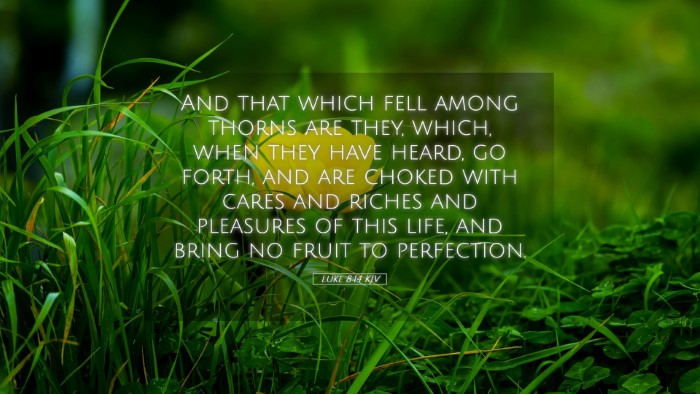Commentary on Luke 8:14
Luke 8:14 states, "And that which fell among thorns are they, which, when they have heard, go forth, and are choked with cares and riches and pleasures of this life, and bring no fruit to perfection." This verse is part of the Parable of the Sower, a profound teaching that illustrates the different responses to the Word of God.
Contextual Overview
This parable, as recounted in the Synoptic Gospels (Matthew, Mark, and Luke), offers insight into the human heart's receptiveness to God's word. In Luke’s version, the focus sharpens on the third category of soil—those who receive the word among thorns. This aspect invites us to consider the spiritual and practical implications of distractions and worldly concerns in our lives.
Analysis of "Fell Among Thorns"
According to Matthew Henry, the thorns represent the cares and concerns of life that can choke the spiritual growth of individuals. He observes that many receive the gospel with joy, yet the subsequent pressures of life can lead to a stifled faith. It reflects a crucial truth: hearing the word and initially responding positively does not guarantee ongoing faithfulness or fruitfulness.
Spiritual Implications
Albert Barnes emphasizes that the “cares and riches and pleasures of this life” illustrate the common pitfalls for believers. The tension between spiritual pursuits and worldly distractions can lead to a diluted commitment to God. When the priorities of life overshadow spiritual goals, one risks becoming unproductive in their faith.
Understanding "Choked" in Context
When the verse mentions being "choked," it denotes a violent suffocation or a hindrance to growth. Adam Clarke notes that these thorns symbolize the entanglements of daily living—worries, the pursuit of wealth, and the lure of worldly pleasure. This choking effect does not happen suddenly; it is often gradual, as the individual becomes less vigilant about their spiritual health.
The Reaction to Hearing the Word
The response observed in individuals who fall among thorns is compelling. They initially embrace the gospel but are soon drawn back into worldly concerns. Matthew Henry comments that the heart can be a battlefield where faith wrestles with worldly interests. This underscores the need for vigilance and constant prioritization of spiritual life over materialistic pursuits.
Challenges to Spiritual Growth
- Cares: Worries about life, family, and responsibilities can distract believers from focusing on God's will.
- Riches: The love of money can lead one away from reliance on God, fostering a sense of autonomy that neglects spiritual dependence.
- Pleasures: The pursuit of earthly pleasures can overshadow the eternal joys found in a relationship with Christ.
Call to Action for Believers
There is a pressing call for believers to assess their priorities. How often do life’s distractions pull them away from fulfilling the purpose God has for them? Both Barnes and Clarke emphasize the necessity of nurturing one’s faith through spiritual disciplines—prayer, study of the Word, and fellowship—to uproot the thorns that may hinder growth.
Fruitfulness as Evidence of Spiritual Health
The phrase "bring no fruit to perfection" serves as a sober reminder of the ultimate goal: bearing fruit for the Kingdom. Adam Clarke posits that true faith manifests in good works; if one's life is devoid of spiritual fruit, it can indicate the choking influence of worldly factors. Hence, genuine engagement with scripture and fellowship are vital for a fruitful life in faith.
The Hope for Restoration
Yet, there is always hope. Even those who find themselves among thorns are not beyond recovery. Through intentional seeking of God's presence, believers can cultivate a rich soil for their lives. Henry notes that repentance and dedication can lead to a renewed spirit and a more profound commitment to God's Word, allowing them to overcome the thorns of life's distractions.
Conclusion
Luke 8:14 challenges believers to reflect on their spiritual state and the potential for worldly distractions to impede their relationship with God. Through the insights of esteemed commentators like Henry, Barnes, and Clarke, it is evident that cultivation of spiritual disciplines and the pursuit of a Christ-centered life are essential to overcome the thorns that vie for attention. Ultimately, this parable serves not only as a warning but also as an encouragement to strive for a fruitful life in Christ.


